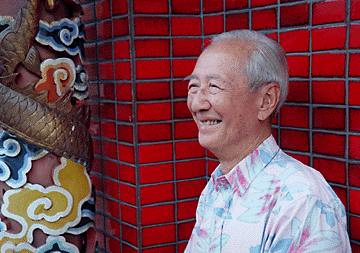


Future promise,
past glory
Cheap rent lures artist
to open cafeSee also: A city awaiting rebirth
By Peter Wagner
Star-BulletinArtist Hank Taufaasau was struggling with the rent at his Waikiki gallery. He decided to chance it in Chinatown.
"We all hope to be in the right place at the right time," he said. "It appears to me that this area in the next two or three years is due for a renaissance. Come later and you pay a higher price."
Taufaasau recently opened Hank's Cafe Honolulu on Nuuanu Avenue below Hotel Street. With its bamboo and lauhala, the cafe is a throwback to Chinatown in the 1940s.
But along with the food and fun, Hank's is an art gallery with many of Taufaasau's large oil paintings and lithographs hanging on the walls.
"I've sold three paintings in last 17 days," he said. "I've never sold three paintings in 17 days."
Like other newcomers to Chinatown, Taufaasau was attracted by low rents -- he pays about $1.50 a square foot at the foot of Nuuanu. Prices range wildly from $1 to $5 per square foot elsewhere in 36-acre district.
Other newcomers have been drawn by Chinatown's promise and affordability. In a small shop next door to Hank's, SmarTitas !nk offers hand-crafted shirts, hats and jewelry.
Across the street, Punani's provides food and entertainment to the pau hana crowd.
Further up the street, early pioneers Indigo restaurant and its neighbor the Hawaii Theater have led the way into Chinatown since the theater was reopened in 1996.
Havana Cabana, winner of a recent Building Industry Association award for its decor, has been open about a year.
Like Hank's, Havana does more than provide a menu and nighttime entertainment.
As its name suggests, people come to smoke cigars or just lounge in a homey atmosphere before diner.
"It's an an interesting concept, something Hawaii doesn't have," said Brian Uy, part owner of Havana Cabana.
Across the street is The Studio of Roy Venters, among several art galleries that have ventured into Chinatown recently.
All are struggling with Hawaii's poor economy. But they share a common optimism about Chinatown.
"We chose this location because rents are extremely high at other prime business locations like Ala Moana or Waikiki," said Uy.
"We took a chance when the Hawaii Theater and Indigo opened.
"It looked like a trendy part of town that would draw people to something new."
At Hanks, which replaced a seedy bar, Taufaasau was looking for an upscale clientele.
But his impressive wine list and selection of fine spirits haven't drawn much interest yet.
"The other night we had a drag queen and her boyfriend, sitting next to three stevedores," he said.

Longtime merchant
By Peter Wagner
recalls days of prosperity
Star-BulletinHE arrived from China in 1938, a boy of 15 with nothing but a suitcase and a letter. "I got off Pier 10 and walked up the street with instructions from my dad that a store owner would take me in," said Hin Chiu Lau, now 75 and a leader in Chinatown. "The first couple of weeks I slept on the floor and had roaches and mice for company."
It's a familiar story in Chinatown, where generations of immigrants have helped boost each other into a new world for more than 150 years in Hawaii.
Lau, who came from Chung Shan, south of Guanzhou, is president of the Chung Shan Association of Hawaii.
He also serves as president-elect of the Hawaii Chung Wah Chung Kung Hui and chairman of Hin Chiu Lau Real Estate Brokerage.
The Chinatown he remembers as a boy was both vibrant and backward.
"The country I left behind was more advanced in transportation and housing," he said. "We still used kerosene lanterns."
After several months of sharing meals and helping out at Yuen Yuen Co. Ltd., an import grocery store on Hotel Street, Lau found a job delivering groceries for $20 a month.
"That was very big money," he said. "I bought a bed and a radio and a lamp and moved into a rooming house on Kukui Lane."
Then came the war and higher pay -- 46 cents an hour -- as a civilian laborer.
It was the start of Lau's climb to success.
"I had so much money I started looking for a girlfriend," he said.
Chinatown continued its long tradition as a beehive of small businesses until Ala Moana Shopping Center was built in 1960 and retailers began an exodus across town.
"It became almost a ghost town," Lau said.
Now a member of the mayor's Chinatown Task Force, Lau recently found himself on familiar ground during a ceremony at the corner of Hotel and Maunakea streets where the city plans to build a $2.2 million police station and community center.
Sixty years ago, it was the site of Yuen Yuen Co. Ltd. -- Lau's first home in Chinatown.